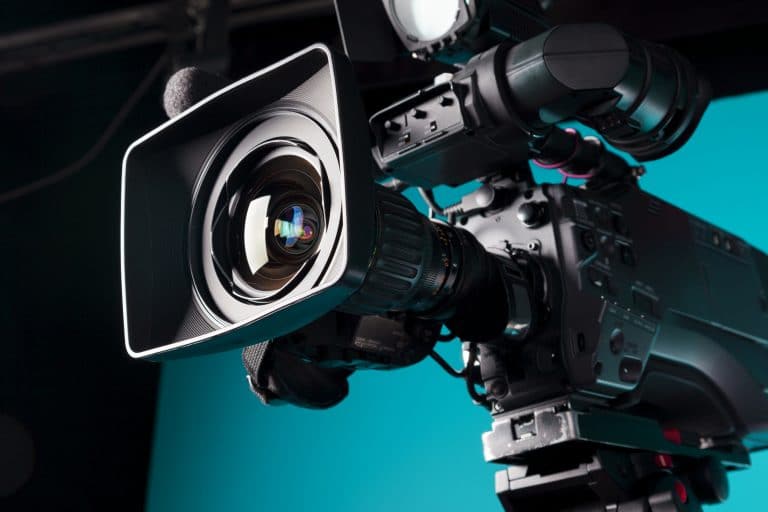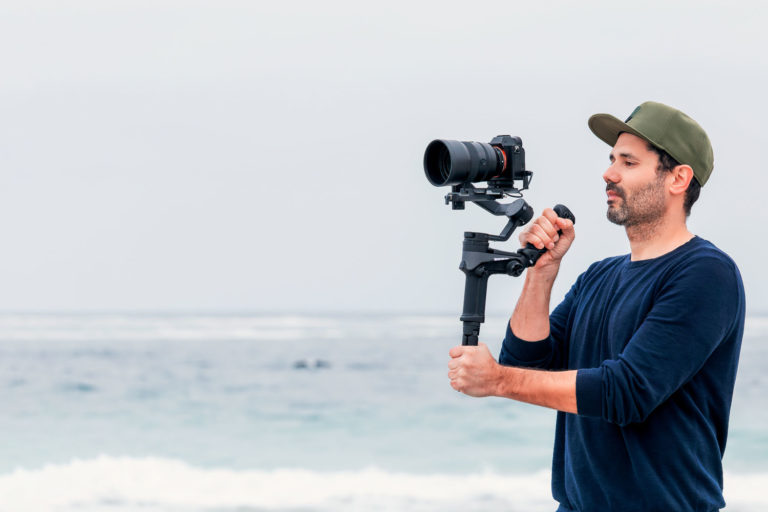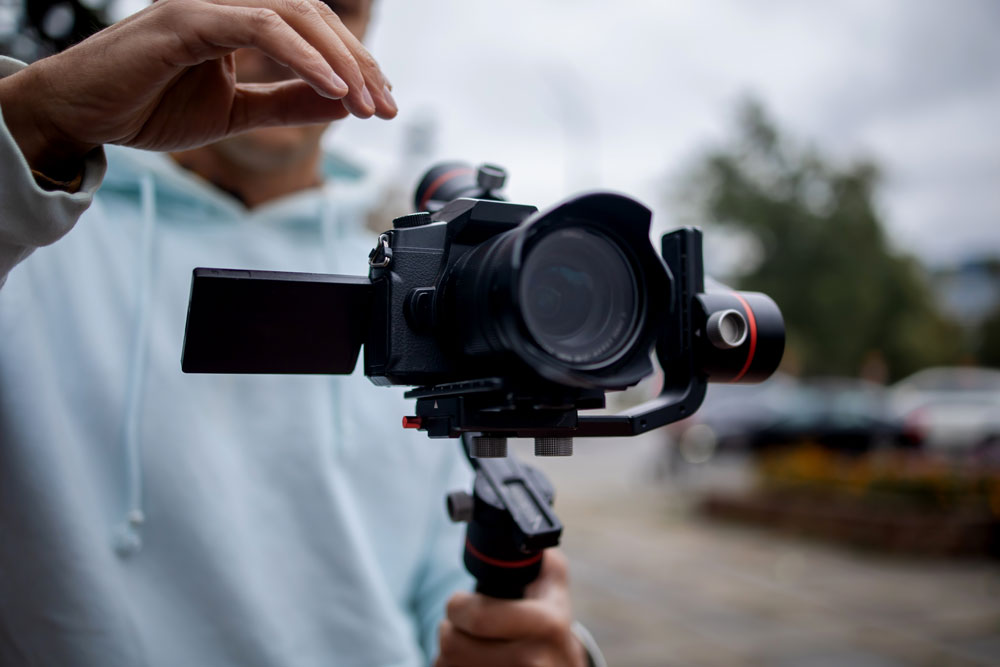Whether from a love of film or a love of filming, you’re ready to turn your hobby into a paying gig – and now you’re wondering how to start a videography business.
And it’s a good time to get into the industry. Videographer jobs are growing at a faster rate (10%) than other industries, and salaries have increased 13% over the past few years.
Becoming a professional videographer doesn’t require years of schooling (which is not to downplay the countless hours you’ve spent practicing and honing your craft). So your dream can become a reality in only a few easy steps.
6 Essentials for Starting a Videography Business
From choosing your niche and branding yourself to getting the right equipment, we have all the tips for new videographers need to launch a videography business.
1. Choose Your Niche
Choosing your videographer business niche starts with the answers to questions like these:
- What subjects are you most interested in recording?
- Are you a sports fanatic who loves capturing game-winning touchdowns?
- Do you prefer shooting weddings, travel documentaries, or special events?
- Are you looking to travel locally, nationally, or internationally?
- What type of customers (e.g., families, couples, businesses) do you want to work with?
Knowing who you want to work with or what you want to film is a step in the right direction. Once you have a sense of where your passions and interests lie, you can find out which niches or specialties offer you the most opportunities.
Some specialties to consider when starting a videography business are:
- Weddings and special occasions
- Video journalism (news/media)
- Documentary
- Travel
- Wildlife
- Commercial or residential real estate
- Corporate events
- Training videos
- Educational or institutional
As you narrow your scope, do some research to see whether your chosen market is saturated with competitors or has room for a videography business like yours.
Pro Tip: Do you know any videographers or have videographer friends who started a business? Contact them and set up a meeting to talk shop and pick their brains.
2. Write a Videography Business Plan

Writing a business plan when you’re starting a videography business is like mapping out a road trip. It shows where your business is starting from, and where you want to take it in the short and long term.
This plan helps you target and meet goals, pitch to potential partners or investors, apply for financing, drive your marketing efforts, and more. Most videographer business plans include these sections:
- Executive Summary: Write about your reasons for starting the business and create mission, vision, and values statements.
- Company Overview: Breathe some personality into your organization by explaining your brand’s identity, unique selling points, and offered services.
- Market Research: Outline the state of your industry, target market, and ideal customers, and give an overview of the competition.
- Financial Plan: Jot down financial requirements, how money will be budgeted, quarterly projections, and more.
- Marketing Plan: Map out practical and strategic promotion strategies and tactics (i.e., pricing, social media, print ads, marketing collateral, website, direct mail, and so on).
- Operations and Management: Identify who is responsible for specific duties, reporting, and so on. Think about how you’ll scale your business as demand for your videography services grows.
- Milestones and Goals: What milestones do you want to achieve in the next one, three, or five years? The more specific you are, the easier it will be to create a roadmap of financial, promotional, and operational strategies to get there.
To make it easier, check out this downloadable template and example of a business plan for a video production company.
3. Set Up Your Business Operations
If you already own some equipment, it’s surprisingly easy (and cheap) to start a videography business — but setting up your business the right way is important. It’s key to your professional credibility, success, and growth as you start a videography business.
Decide on a Name
Your videography business needs a name. Something that captures the brand image you want your business to stand for, and a name that’s memorable and meaningful to your customers. To come up with ideas, try brainstorming with friends or loved ones who have a sense of what your professional brand would be.
Alternatively, the branding experts at Looka have a free business name generator you can use (and some cool ideas and tools for building a logo). If you don’t find anything there that feels picture-perfect, try using an artificial intelligence (AI) engine like ChatGPT to source more ideas.
And keep in mind that with photographers and videographers, clients often remember you by name and refer you that way. So there’s nothing wrong with making your name the center of your brand identity.
Choose a Business Structure
Consider if you want to establish your business as a sole proprietorship or LLC (LLC stands for limited liability company).
Sole proprietorship means you, the business owner, are responsible for business debts and obligations. An LLC creates a separate legal entity that protects your personal assets if your business is sued or unable to pay debts. Other business structures include:
- Partnerships
- Corporations
- Nonprofit corporations
- Cooperative —and more
If you’re not sure what’s the best structure for starting a videography business, it’s best to consult with a lawyer or tax professional. You can find one in your area or get expert advice and help to launch your company through platforms like LegalZoom, which can help with this and most of the other business set-up tasks you’ll need to complete.

Register Your Business (Federal, State, and Local)
Apply for an Employer Identification Number (EIN). This is your business’ registration at the national level. You’ll need it to work as a 1099 contractor, pay taxes, hire employees, and more.
There’s also a new federal registration requirement for solopreneurs and small businesses. Read up on what you need to do to comply with the Corporate Transparency Act (CTA).
Register your business with your Secretary of State’s office or other designated state agency. In addition, your city or county might have business registration rules that apply to you, so do your homework to ensure you check off all the right boxes.
Get Videographer Insurance
Filming without insurance is like working as a trapeze artist without a net. Videographer insurance is a safety net that can protect your business (and finances) from the unexpected risks of recording moments.
Plus, you’ll need it to book gigs! Companies, venues, and event organizers who hire videographers almost always require you to show proof of insurance. Many also require to be added to your policy as an additional insured — so insurance isn’t a step you can skip.
Here are the essential types of coverage you’ll need when you start a videography business:
- General Liability Insurance: Safeguard yourself from third-party medical, property damage, and slip-and-fall claims.
- Professional Liability (Failure to Deliver): If your clients are dissatisfied with your work or things outside your control happen (say faulty memory cards, an unhappy bridezilla, or your inability to attend a video shoot due to sickness or a family emergency), this coverage can defend you against claims and lawsuits.
- Camera Equipment Coverage: Protect yourself from paying replacement or repair costs if your equipment is stolen or damaged during a video shoot.
- Data Breach Insurance (Cyber Liability): If you hold client data and sensitive information on your computer, tablet, or phone and experience a cyber attack, this coverage can protect you from paying out of pocket for the damages and recovery fees.
Set Up a Business Bank Account
Separating your business and personal finances from the start is essential — even if your business is set up as a Sole Proprietorship. It makes your business much more credible and professional to clients and simplifies things that are already complicated, like registering your business, and filing and paying taxes.
Create a Contract or Client Agreement Template
Having a contract helps to manage client expectations and can protect you in the case of a lawsuit. Your client agreement or contract should outline the scope of services the client is paying for, how much the client has agreed to pay, and what you’re promising to deliver.
Contracts are legal agreements between you and your videography clients. As such, it’s best to get legal help to create a template you can use for your new business. To see an example of what to include, check out this videography contract template from eForms.

Get Help to Start a Videography Business
If you need some help with any of these items or are looking for business advice, here are a few more great resources:
- Federal government assistance and advice from the U.S. Small Business Administration
- Reputable free legal help to start your videography company (if you qualify)
- Companies like LegalZoom can help you decide on the right business structure and get it set up — they also have business document templates and even an eSignature service to help with contracts
- Free training and consulting is available through local chapters of America’s Small Business Development Centers (SBDC)
- Get help to make sure you do your taxes right from the IRS’ Small Business and Self-Employed Tax Center
4. Get the Right Equipment and Software
Being a videographer means investing in the right gear and equipment. Some quick tips for buying equipment include:
- Doing research to determine the best camera and equipment for your videography business niche
- Establishing a budget (and potentially obtaining financing)
- Saving money by sourcing used gear that’s still in good condition
- Paying less by going with lesser-known brands
- Signing up for email lists
When starting a videography business, here are some videographer equipment and video editing software to consider:
- Lenses
- Camcorders
- Multi-purpose, POV, and digital cinema cameras
- Tripods and rigs
- Memory cards
- Microphones
- Audio cables
- Adobe Premiere Pro
- Apple iMovie
Your camera and associated gear are likely to be your main and biggest investment when starting your company. So don’t fail to protect this investment with camera equipment insurance. You won’t have to worry about replacement or repair costs in case of theft or loss.
5. Price and Package Your Videography Services
Consider using tiers, bundles, and add-ons, such as black-and-white-style filming, photography services, visual effects, short reels suitable for social media, and more.
As you determine pricing for your services, also look at competitors’ pricing plans and tiers to make sure you can compete but also aren’t leaving money on the table.
Other pricing considerations should include:
- Your time investment
- Supplies (like memory cards) and equipment, and equipment wear and tear
- Travel costs like food, gas, mileage, flights or hotel stays
- The need to hire a second shooter or additional film crew
- Expedited services like same-day editing
6. Brand and Promote Your Videography Business

Now that you’ve made it this far, you may be wondering how to promote your videography business and actually start landing clients! No worries. We’ve got you covered.
Give Your Business a Strong Identity
Besides a great name, your new videography business deserves to have a killer logo and unique colors to make it stand out and memorable. Here are some options for developing your brand’s visual identity:
- Platforms like Canva make it easy to source or create original logos and come up with brand color schemes.
- Get affordable help from freelance graphic design and branding professionals through Fiverr, with logo design starting under $25.
Build a Website
Squarespace and Wix are two of the website builders for creatives. Both use artificial intelligence (AI) to make site building easy and have lots of design elements you can use to showcase your work and services. Wix even has tools built in to help you find the right keywords so your page appears in specified search results.
Pro Tip: Make sure to check out how your website displays on both computers and mobile devices to ensure your site looks great no matter where customers find you.
Claim Your Google Business Profile
Get a free Google Business Profile and personalize your profile with video samples, photos, offers, and more. Not only can this help local customers find you — but it also helps your videography business get more online visibility in search results.
Get Active on Social Media
Social media makes it easier to reach potential clients and network with fellow videographers. Find out where your ideal customers like to engage and be active on those channels. You can create business profiles for your new company at no cost, post updates, and engage with others.
The other great thing about social media is that there are so many options. Consider getting a YouTube or Instagram profile if you like making long videos. Do you enjoy writing posts to explain or caption your videos? Get an X (formerly Twitter) or Facebook account. Join Facebook groups where people in your local or target market source small business referrals.
Advertise Your Videography Services
Your business might be invisible if you’re not advertising your brand to your target audience. Several paid advertising options can give you more visibility:
- Google Local Ad Services: This is a Google ad solution specifically for local service providers. It can get your business name at the top of local searches for videography businesses in your area and increase your credibility with trust badges that get clicks.
- Meta Ads: Get acquainted with Meta’s ads for more traffic and awareness on Facebook, Instagram, Messenger, and other platforms in the network. This ad platform has exceptional tools for reaching the exact demographics you look for in clients, so your ad spend can go a long way and produce a high return on investment.
- The Knot: The Knot has vendor services with storefront, networking, and review tools to put your videography business at the forefront of the wedding industry with targeted ads.
- Print Ads: Contact your local newspaper or community publication about advertising opportunities and rates.
- Direct Mail: Direct mail has a relatively high response rate, and many direct mail services can micro-target your mailing to specific industries or to local neighborhoods, cities, counties, and so on. Plus, there are mailing lists available for just about any type of audience you want to reach.
Also, don’t be afraid to get professional help from a local marketing or ad agency. Many have done their homework and will come to the table with ways to reduce your cost per acquisition while increasing your leads with all of these tactics and more, making your expense well worth the return on investment (ROI).
Network With Other Pros
Sometimes, it’s helpful to rub elbows with other videographers (and photographers) to compare ideas, network, and build friendly competition. Where can you meet them? Conventions, parties, social channels, and videographer or photographer associations can all give you access.
Some popular videographer associations include:
Is Now the Right Time to Start a Videography Business?
As the Chinese proverb goes, “The best time to plant a tree was 20 years ago. The second best time is now.”
If you’ve got the passion and entrepreneurial interest needed to launch a business, the odds may well be in your favor. Videographers can make a good living and with the pandemic in our rearview mirror, demand for videography services is on the rise.
Here are a few videography stats and trends we find especially compelling:
- The average salary for videographers is $63,930 (ZipRecruiter).
- The city with the highest videographer salary is $82,078 in Novato, CA (ZipRecruiter).
- The film and video market size could reach $390.76 billion in 2028 (The Business Research Company).
- Experts estimate the advertising video production market could reach $103.43 billion by 2030 (Verified Market Research).
All it takes for you to start your business is a strategy and a push.

Frequently Asked Questions on Launching a Videography Biz
How Can I Get Started In Videography?
To get started in videography, you’ll need a video camera, a creative point of view, and some training and experience. You can take a professional course or study on your own – the more hours you spend practicing your craft, the easier it will be to start a videography business.
How Much Does It Cost To Start A Videography Business?
Starting a videography business costs anywhere from $200 for a business license and insurance to $10,000+. If you already own equipment, your costs could be at the low end of the range, but can quickly increase if you need to buy equipment and cover other business basics like office space, legal fees for contracts, professionally designed marketing assets, and more.
What Kind Of Insurance Do I Need To Start A Videography Business?
The minimum insurance you need to start a videography business is general liability, which is designed to cover third-party injury or property damage claims. But you face other risks as a videographer, so add-on coverages like professional liability (aka failure to deliver), camera and equipment (inland marine), and cyber liability (aka data breach) are highly recommended.
How Much Do Beginner Videographers Charge?
On average, beginner videographers charge anywhere from $20-$40 an hour to $200 for a day rate. Payment varies on several factors, including time spent filming, editing, travel, the going rates of other photographers in the area or niche, and equipment needed for the shoot.
Do Videographers Make Good Money?
Yes! ZipRecruiter says the average salary of a videographer is $63,930. The top five most lucrative cities for videographers include:
- Novato, CA: $82,078
- Berkeley, CA: $80,766
- Renton, WA: $78,494
- Newark, CA: $78,070
- Santa Monica, CA: $77,866




